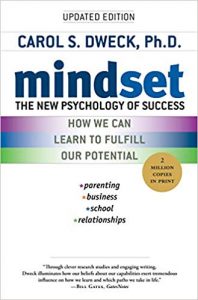One of the (few) blogs that I follow on a daily basis is A Learning A Day written by Rohan Rajiv. It’s interesting to read his observations on life, what he has learned, and how he is applying the lessons learned.
In addition to his observational posts, he occasionally makes mention of books that he has found particularly insightful. At the end of 2017, he wrote about 5 books that had a significant impact on him. Given my interest in self management and self improvement, one of the books that looked particularly interesting on his list was Mindset by Carol Dweck.
Carl Dweck is a psychology professor whose primary research interests are in motivation, personality, and development. According to her bio on the Stanford University website, her work “examines the self-conceptions people use to structure the self and guide their behavior. My research looks at the origins of these self-conceptions, their role in motivation and self-regulation, and their impact on achievement and interpersonal processes.” Her book Mindset is a reflection of this research that examines how the view one adopts for one’s self affects the way one leads their life.
She defines two types of mindsets people use to guide their behaviors. On one end of the spectrum is the ‘fixed mindset.’ Under this mindset, one believes that their qualities are carved in stone from an early age and unable to change. At the other end of the spectrum is the ‘growth mindset.’ Under this mindset, one believes that their basic qualities can be cultivated through one’s efforts, one’s strategies, and help from others. According to Dweck, mindsets are just beliefs, and one makes a choice between the two as to which one guides their behavior.
In comparing the two mindsets, Dweck consistently shows the benefits of choosing a growth mindset both through her research and real life examples. She details how the growth mindset is one where a person is always learning. It is a more productive mindset where success is about more than results. It’s about learning, stretching one’s self, becoming smarter. One of the most important points she makes about the growth mindset is how it “allows people to love that they’re doing – and to continue to love it in the face of difficulties.”
She makes another important point that these mindsets co-exist on a spectrum. In other words, a person is not exclusively a fixed mindset or growth mindset person. Instead, a person is a blend of the two. There are times when we tend towards a growth mindset, and there are times when we lean towards a fixed mindset. Since the fixed mindset can inhibit us from achieving our full potential, Dweck urges us to be aware of when our ‘inner voice’ slips into fixed mindset mode. Once we recognize we’ve slipped, we need to make the conscious choice to switch back to a growth mindset mode.
With this groundwork laid, Dweck use the remainder of the book to show how the growth mindset leads to better outcomes in multiple fields including sports, business, relationships, parenting, and teaching.
I really enjoyed Mindset. It clarified and helped bring together a lot of ideas and activities that I’ve been doing to improve my overall mindset. While I wouldn’t consider it one of my Must Read books, it’s a very worthwhile read. Regardless if you’re just starting down the path of self management or already far along in your journey to self mastery, you’ll get a lot out of it. I’d like to personally thank Rohan for the recommendation. Well done!


The game-changing and thought-provoking book “Book Review: Mindset – The New Psychology of Success” encourages readers to reconsider how they approach success and personal development. This book is a transformational and enlightening experience for everyone because of Carol S. Dweck’s revolutionary insights into the power of attitude. These insights provide invaluable lessons on resiliency, learning, and unlocking one’s real potential.